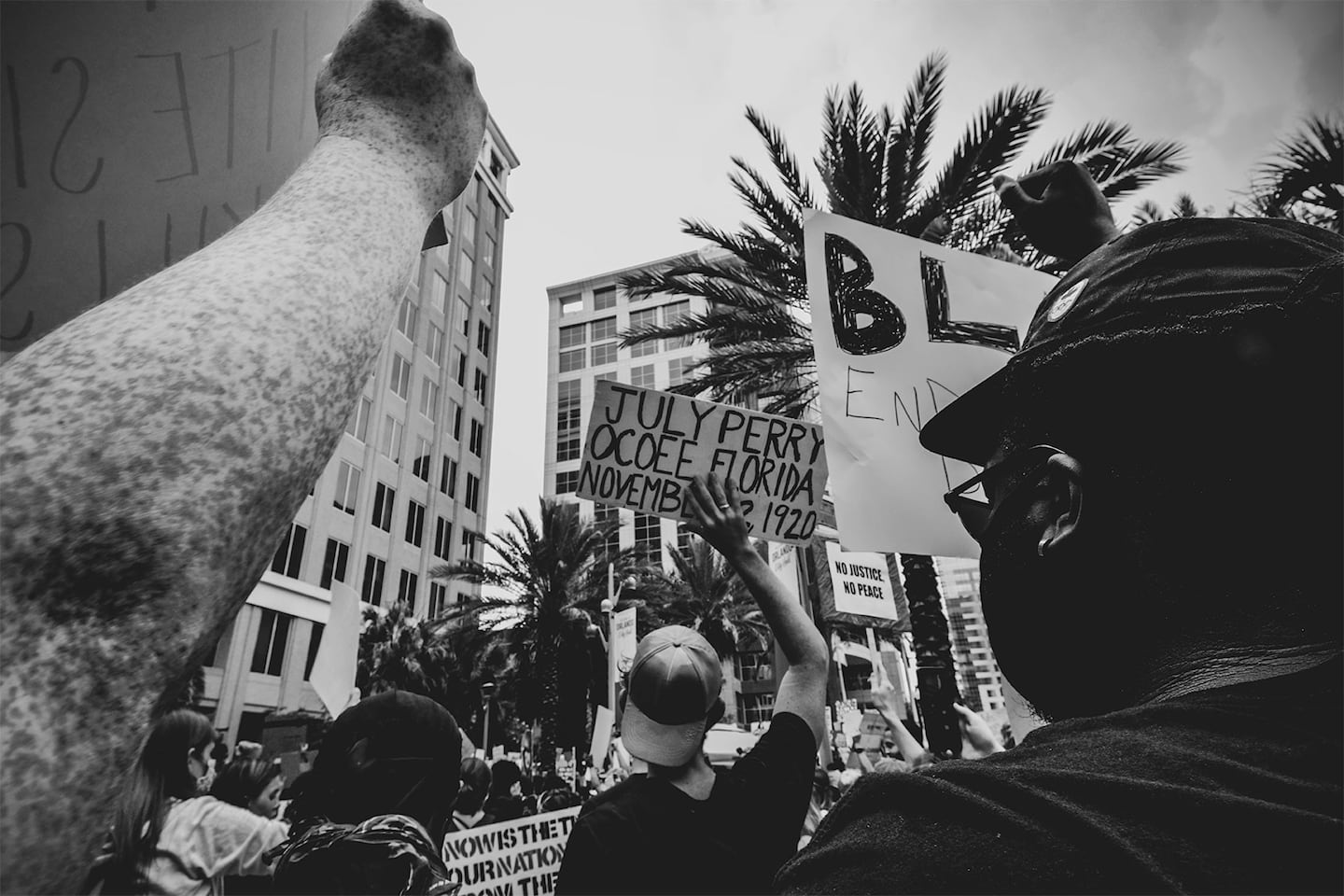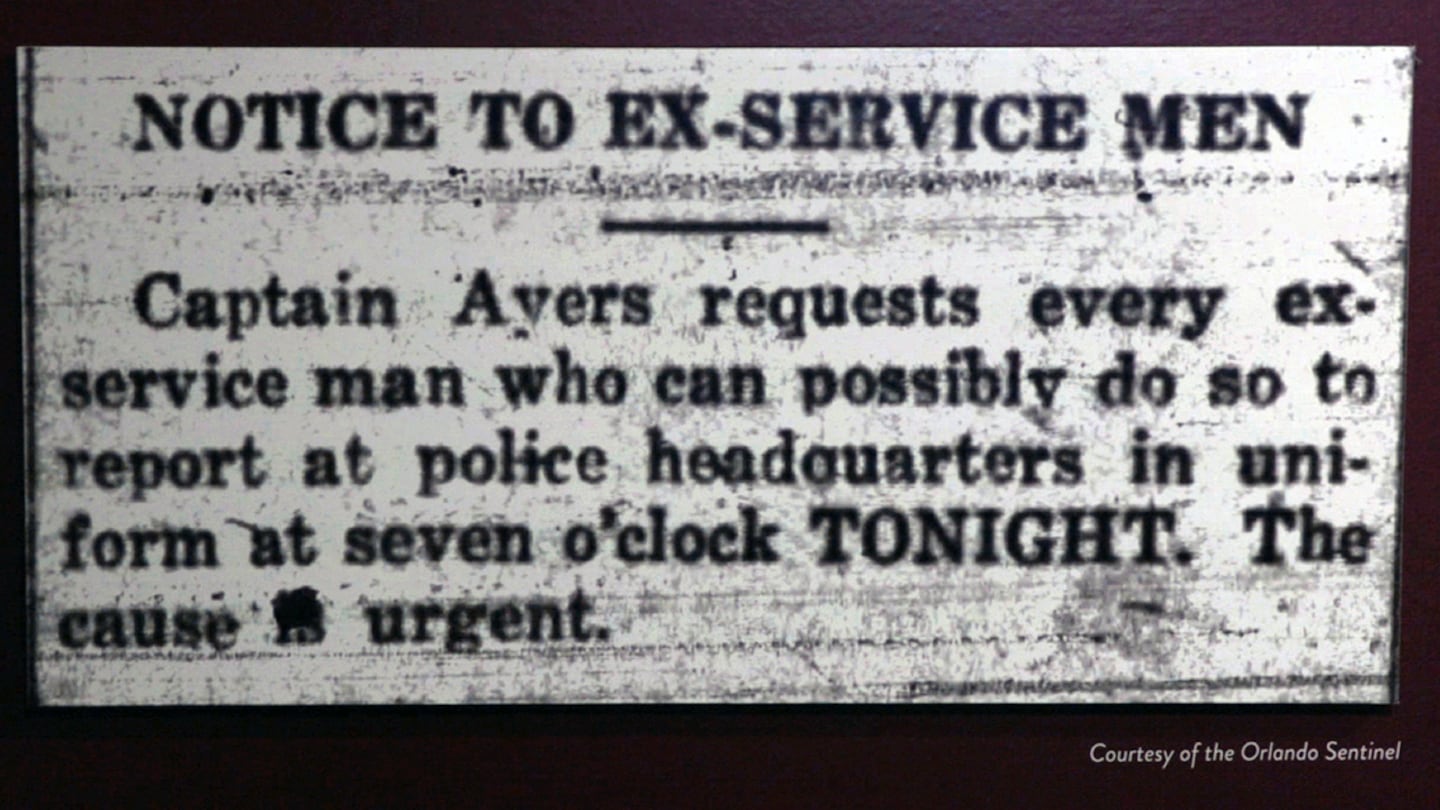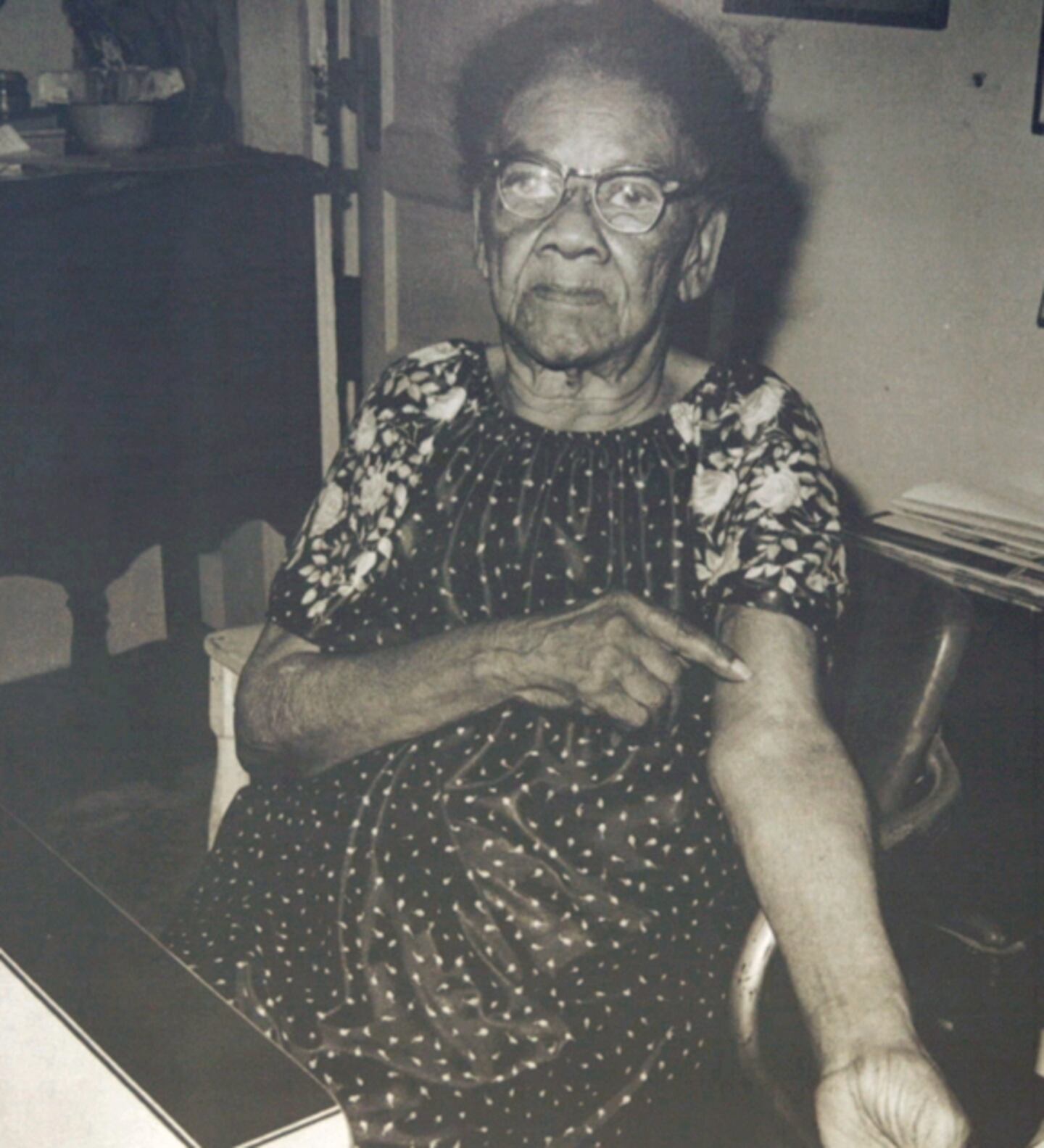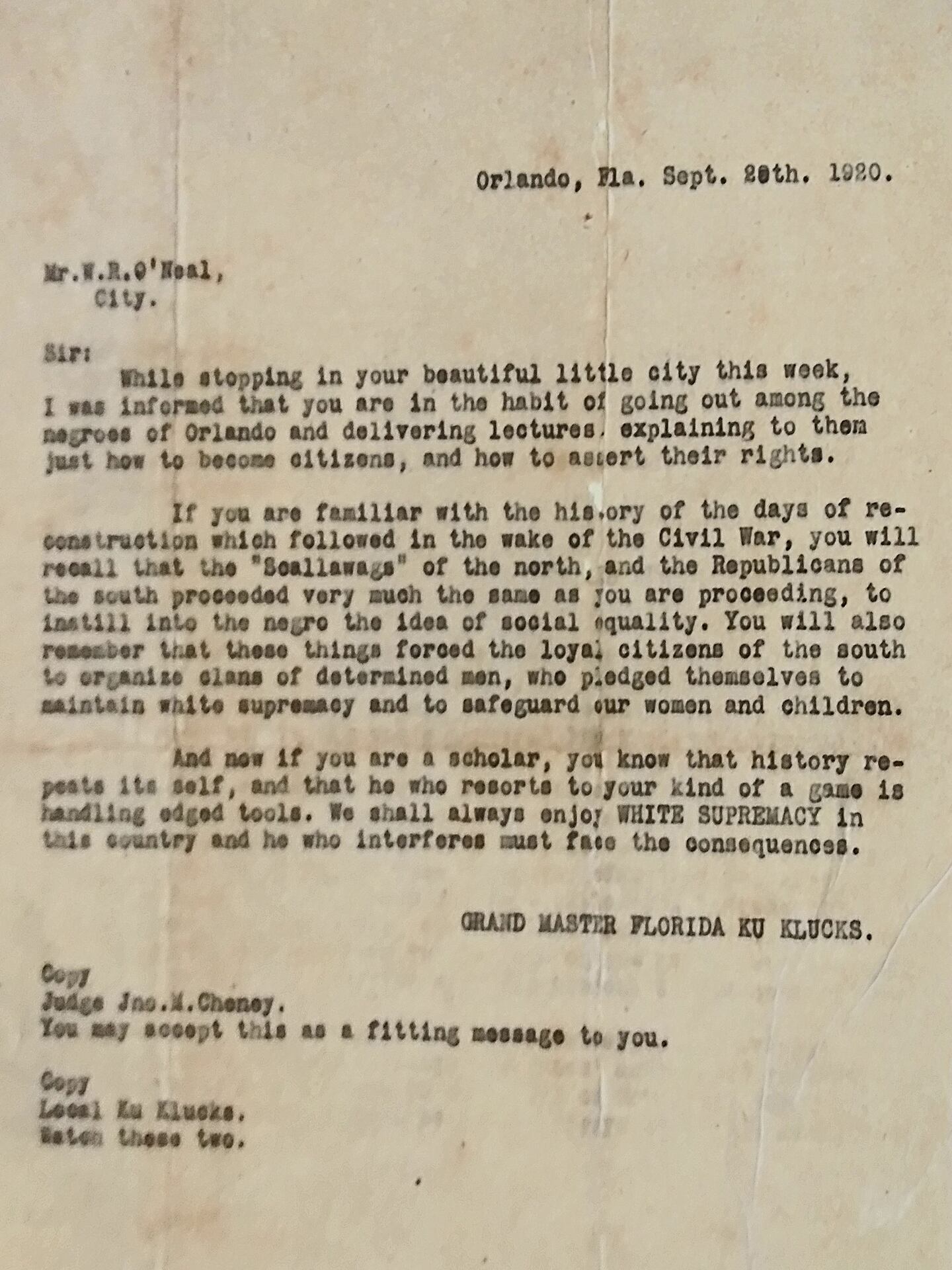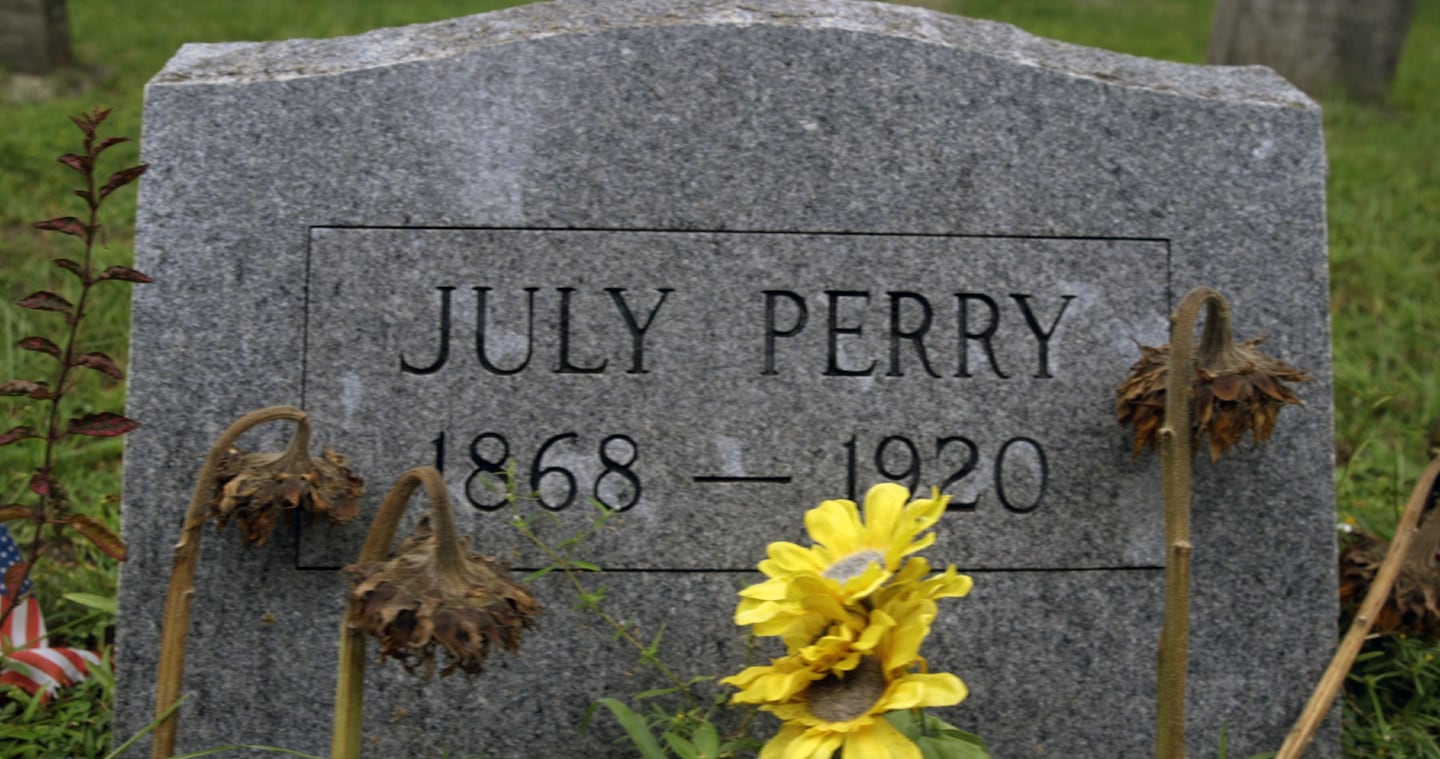The sign said his name: Julius “July” Perry.
A young man held it up during one of the many protests following George Floyd’s killing at the hands of a Minneapolis police officer on May 25, 2020.
An image captured in the tumultuous summer of 2020, recognizing another Black man tortured and lynched 100 years earlier – election day 1920, in Ocoee, Florida.
“Looking at George Floyd’s brutalization at the hands of white law enforcement against a Black man. It’s a very similar story to 100 years ago -- July Perry at the hands of Sam Salisbury and his crew,” said Pam Schwartz, historian at the Orange County Regional History Center. “People who know this history are connecting it.”
Back then, in Ocoee, people knew Julius Perry. Black people. White people. Businessmen. Citrus pickers. Sharecroppers. Politicians. Law Enforcement. The Klan. They all knew July Perry. Like many other Black Americans at the turn of the last century, he left the Carolinas for better pay in Florida’s booming agricultural industry.
“There were some Blacks that migrated and some whites that migrated,” said Melissa Fussell, a lawyer who produced a legal review used for a government analysis of the Ocoee Massacre. “July Perry in particular, and Moses Norman and Valentine Hightower. They came from South Carolina looking basically for better work and land to cultivate.”
“A Straw Boss”
But July Perry wasn’t content picking fruit and packing boxes of citrus. He eventually became a “labor broker.”
“Mr. Perry was what they call a ‘straw boss,’ which meant that no African-Americans would work for a white employer, unless they came through Mr. Perry,” said Jerry Girley, who was once a member of the West Orange Reconciliation Task Force. The group included new and long-time Ocoee residents, along with white descendants of those who participated in the massacre in 1920. It was set up to help the city bridge its racial divide.
Broker was a lucrative position to hold in the Ocoee of 1920, especially when negotiating how much Black people, upon whom the region’s agri-business depended, would get paid.
“Perry got a cut,” Girley said. “He told them how much they should get paid. Perry was a baller.”
“The white community would have to go through July Perry or another labor broker in order to obtain Black workers for their farms or their households or whatever,” Fussell explained. “So really it’s a way of organizing, organizing labor.” Perry was all business, but not ostentatious or flamboyant, those who have studied his life said.
“You know, with my research, July Perry was a very powerful Black man,” said Francina Boykin, a member of the Democracy Forum, a group set up to seek answers and research the Ocoee Massacre. “He was an independent farmer. He was a labor broker. He was amazing.”
Records of Perry purchasing land in the area date back to as early as the 1890s, Schwartz said. Other prominent, Black, land-owning families were also part of the Ocoee community.
“In 1920, there was a thriving African American community, almost half of the city of Ocoee, based on the census, were people of African ancestry,” said State Representative Geraldine Thompson, who represents Ocoee today.
This all changed after Perry’s lynching.
“After 1920, there was only one African American left in Ocoee,” Thompson said. “The others had either been killed or run out of town. And that remained the situation until almost 80 years later, before African-Americans came back to Ocoee.”
That’s probably because word of what happened to Julius Perry passed down through the generations. Perry’s descendants know the family history and Julius Perry’s story all too well.
“At the time he had amassed a pretty well-known image there in the city of Ocoee as being someone that everyone knew,” said Stephen Nunn, July Perry’s great-grandson. “And he was not only a friend really to just the Black community. He really was a friend to some of the white community as well. But, you know, there’s always those that just are not going to be accepting to change, into something different, than control.”
500 Ku Klux Klan members
Control of the status quo was considered, by many in the white community, threatened by men like Perry and his business associate Moses ‘Mose’ Norman. Black community leaders like them were being courted by the Republican Party and encouraged to vote in the presidential election. All this, as the Ku Klux Klan, about 500 strong, marched through Orlando and warned Blacks not to vote. Former Ocoee Mayor, Lester Dabbs, wrote in a thesis published in 1969, "there was a branch of the Ku Klux Klan in West Orange County at the time, and from all accounts, the headquarters of this unit was in Winter Garden, and citizens of Ocoee and Orlando held associate memberships.
It did nothing to deter Perry, who was 51 or 52 at the time.
“And so Mose Norman and July Perry decided in 1920, if now women can vote, certainly I’m a man. And, I paid taxes in this community and I’m going to the polls and I’m going to vote,” Representative Thompson said.
Voting records indicate 114 people came out to vote in the Ocoee precinct that November 2. Among them were 27 Black voters, including Julius Perry and his wife Estelle, Schwartz said.
When Mose Norman attempted to vote, there was a serious dispute. Historians hear different variations of what happened next, but this much is certain: a mob of white men descended upon July Perry’s home with him, his wife and children inside.
Among the members of that mob: Clyde Pounds, a deputy sheriff, and Colonel Sam Salisbury, a former police chief in Orlando. Some believe they thought Norman might be hiding out at Perry’s home.
“His life was going to end needlessly and violently.”
— Jesse Girley
As Perry attempted to protect his family from the men trying to enter his home, a gunfight ensued. Ultimately Perry ordered his wife, his daughter Coretha, and their other children to escape while he remained behind.
“He knew what, as they say in the vernacular, he knew what time it was,” Girley with the Democracy Forum said. “It was the time that his life was going to end needlessly and violently.”
According to Fussell and others who have studied the records and testimony following the incident, Perry suffered a serious gunshot wound.
“His arm is actually blown away,” Fussell said. “They take him to a hospital, which I don’t think was a merciful act. I think they wanted to prolong his life.”
She says it is unclear if Perry was ever taken to the jail in Orlando.
“Definitely the oral history in the Perry family is that he was dragged behind a truck whenever he is taken to Orlando,” Fussell said.
Ultimately, Perry was hanged from a telephone post an his body was riddled with bullets, the author Zora Neale Hurston wrote in a published accounting of the 1920 massacre. Some accounts maintain this occurred outside the home of Judge John Cheney, the man who had encouraged Perry, Moses and other Black men to vote ahead of the election. The KKK had warned Cheney through a letter to stop trying to organize Blacks to vote.
Wherever the lynching occurred in Orlando, the message was unambiguous.
“He was murdered, and brutalized, absolutely brutalized, up until and potentially past the point of his actual death,” Schwartz said.
Perry’s family members living in other parts of Florida weren’t even notified of what happened to him right away.
“It was not until several days later that they were told that he was lynched,” said Sharon McWhite, Perry’s great niece. “Not because he was doing anything wrong; because he was doing everything right. Not only for himself as a father, as an activist, as an uncle, as a law-abiding citizen. None of that mattered, but he was trying to exercise his human, right, which we all have.”
“There’s kind of an effort to minimize who July Perry was.”
— Melissa Fussell
Perry was buried in a pauper’s grave in downtown Orlando at Greenwood Cemetery. His land was taken over by Bluford Sims, a Confederate veteran and prominent member of Ocoee’s white community for whom one of the city’s main avenues is named to this day. And there are questions about his certified death certificate.
"So, you’ll see on the death certificate that he died by being hung, but then you see in markedly different handwriting that it was not caused by the racial disturbance. So, you have this certified public record that is demonstrably false, and it makes you question the credibility of, of other public records at the time, Fussell said. There’s kind of an effort to minimize who July Perry was, if you look at his death certificate.
“It says that like, his father is unknown, for example, which is not true. It says he was a farmer. Well, yes, but no, he was much more than that. So, when you look at the death certificate, you can see how, how little respect there was for him as a person, because he was Black,” Fussell said.
Representative Thompson maintains that one of the great challenges facing Ocoee today is confronting and acknowledging this uncomfortable past – and learning from the tragic story of Julius Perry.
Thompson introduced and helped pass a bill to rename a portion of Silver Star Road in Ocoee, Julius “July” Perry Memorial Highway.
“A lot of people don’t know the name, Julius, July Perry,” Thompson said. “So, this road marker will begin that conversation. Certainly, it does not restore what was lost. And the family members have not been made whole, but it will recognize that July Perry lived here and was a businessman, a prosperous individual…”
The markers, the signs, will say his name, and as Thompson explained, the people who see them will say it, too: Julius “July” Perry.
Cox Media Group

